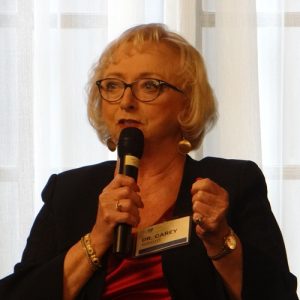Get stories like this delivered straight to your inbox. Sign up for The 74 Newsletter
When Mississippi lawmakers in 2013 approved legislation to improve students’ basic reading skills, it fell to State Superintendent Carey Wright to make it happen.
She ensured that all K-3 teachers were trained in the “Science of Reading” and hired literacy coaches at schools that had the highest percentage of low-achievers.
To guide the effort, Wright turned to the Regional Educational Laboratory Southeast, based at Florida State University, one of 10 federally funded labs nationwide. Little-known even among many educators, the labs, created by Congress in 1965, work with states and school districts to implement research-based practices.
By 2019, Wright and her colleagues had pulled off what is now known as the “Mississippi Miracle,” with students in this deep red state making greater literacy gains than in any other. Fourth-graders in Mississippi rose from 49th in the nation to 29th — adjusting for demographics, it now ranks near the top of the U.S. in both fourth-grade reading and math, behind just Florida and Texas, according to the Urban Institute.
“They were huge partners with us,” Wright said of the lab in an interview this week. “It’s just this amazing group of researchers and content-area specialists.”
I can’t say enough about how important they were.
Carey Wright, Maryland schools superintendent
But that distinction wasn’t enough to save the Regional Educational Laboratory Southeast — or the nine other RELs, as they’re called. On Thursday, the U.S. Education Department announced that it had terminated $336 million in contracts with the labs, saying auditors had uncovered “wasteful and ideologically driven spending not in the interest of students and taxpayers.”
It cited one lab’s work advising schools in Ohio to undertake “equity audits,” but provided no other examples.
The move has left researchers and literacy advocates shaking their heads. A director at a top research firm with many federal contracts, who asked not to be identified to avoid retaliation, said she got the sense from the sudden, broad cuts that “no one went in and took a really careful look at where the RELs were being helpful.”
While some lab projects likely haven’t led to improvements in practices or student outcomes, she’s doubtful that department officials even pored over such data. “Someone decided that this whole program needed to go.”
An Education Department spokesperson did not immediately respond to a request for comment. Since the centers are mandated by Congress, the department has said it will offer contracts to new bidders, but several observers said they were skeptical of this claim.
Understanding early literacy
While Mississippi’s 2013 law mandated that Wright implement research-supported teaching, as state superintendent “you can’t really be in every classroom making sure that’s happening,” said Rachel Dinkes, CEO of the Knowledge Alliance, an advocacy group that pushes for evidence-based policy.
That’s where the lab came in: It developed tools that allowed Wright to gather data about what was actually happening in classrooms, tell lawmakers about its effectiveness and ask for more money to continue the work.
It focused primarily on helping teachers learn about the Science of Reading, implementing a survey that evaluated their knowledge of early literacy skills — as well as instructions for literacy coaches to observe classrooms.
Together, these allowed Wright to track teachers’ engagement with students and identify where teachers needed improvement.
“They helped us develop resources that our teachers could use, that our leaders could use,” Wright said. “If there was something that we wanted to have evaluated programmatically, they would come in and evaluate that for us to inform our decision making. I mean, I can’t say enough about how important they were.”
Wright also implemented tough reforms that weren’t always popular, such as a policy of retaining students in third grade as a “last resort.” In 2019, nearly 9,000 third-graders, or more than one in four, failed the state’s literacy promotion test, also known as the “third-grade reading gate.”
In a 2023 op-ed in The 74, Wright and co-author Kymyona Burk, a senior policy fellow for early literacy at ExcelinEd, said previous research is clear that students who aren’t reading at grade level when they enter fourth grade “are not prepared for a critical transition — reading to learn — and have dramatically lower odds of succeeding in school or even graduating.”
A 2017 study from the lab found that teachers’ understanding of early literacy skills rose substantially, from the 48th percentile of teachers to the 59th. In schools that Wright targeted for extra help, average teacher ratings on instructional quality also rose, from the 31st percentile to the 58th.
The lab also connected Mississippi educators to others in the region, Wright said, offering “a chance for us to learn from each other, share what we were doing — share strategy, share resources and kind of help each other grow.”
Though Wright hesitated to credit REL Southeast for this achievement, several observers have noted of late that states in the Deep South now lead the nation in improved literacy. In this year’s NAEP report, released last month, four Southern states — Louisiana, Alabama, Mississippi and South Carolina — turned in the largest gains in fourth-grade reading from 2019 to 2024. All four are member states of REL Southeast.
In all, Wright said, she worked with lab personnel for nine years, until she left Mississippi in 2022. She called them “a group of expert partners” ready to help and beloved by her staff, who relied upon them heavily.
“Imagine having content experts at your beck and call for no charge,” she said. “They were really, I thought, just gems of somebody’s creation.”
Losing the labs, Wright said, is “a huge disappointment” for states focused on evidence- and research-based practices. “To not have a reliable partner is a real loss for a state chief.”
The move to zero out funding for the labs may also stand in opposition to a few priorities of the Trump administration itself. In a 74 op-ed last July, Wright, along with Penny Schwinn, a former Tennessee education commissioner, praised RELs as centers that stand ready “to generate and apply evidence to improve student outcomes,” even if too few leaders take advantage of them.
Schwinn now awaits Senate confirmation as deputy secretary of education.
Driven by community needs
Last week’s move has thrown several major research organizations into turmoil.
In a statement, Jannelle Kubinec, CEO of the research group WestEd, which runs two RELs, said the cancellation halts a project in Alaska to support student mental health, one in Nevada that addresses chronic absenteeism, another in Oregon that works to strengthen literacy instruction and one in Utah to address early-career teacher attrition.
The research organization Mathematica, which runs two RELs, said cancellation of the contracts shuts down support for “a wide range of evidence-based work” requested by state and local education leaders, including a project helping teachers in Nebraska improve differentiated math instruction, one helping teachers in New Jersey use evidence-based practices for writing instruction, and one in Maryland that helps educators prepare high school students with disabilities to transition to adult life.
Mathematica also said its labs have worked with South Dakota and Wyoming to combat teacher shortages in rural districts via apprenticeships.
Dinkes noted another instance in which a REL had a huge impact: In Michigan, state leaders turned to their regional lab to find out why so many certified teachers were no longer teaching. It undertook a survey of 60,000 teachers and found that they wanted, among other things, higher salaries, better promotion opportunities and more access to full-time jobs. They also wanted smaller class sizes and student loans, as well as easier, less costly ways to renew their certification.
The state tweaked laws affecting several of these factors and expanded the number of certified teachers who opted to teach.
Several observers noted that the RELs are, in a sense, a response to long standing GOP complaints about federal education policy’s top-down focus: They actually help local educators apply research to problems they themselves identify as crucial.
“The REAL work is driven by the state’s or the community’s needs,” said Dinkes. “It is not directed by the Hill.”
Many states don’t have the research capability to undertake big projects like remaking literacy on their own, said Sara Schapiro, executive director of the Alliance for Learning Innovation, a coalition of non-profit, private and philanthropic organizations that advocate for more R&D investment. “The RELs were really set up as the infrastructure to help them do that.”
She said the labs “are a really good example of this notion of returning responsibility of different functions to the states,” where local leaders can drive a research agenda.
(The labs) are a really good example of this notion of returning responsibility of different functions to the states.
Sara Schapiro, Alliance for Learning Innovation
Several people with knowledge of the situation also said it’s ironic that the RELs would get caught up in a battle over DEI and “woke” ideology, since much of their equity work is driven by states and school districts “seeing disparities and outcomes for their students,” said the research director who asked not to be named. “They’re trying to figure out how they can best address those disparities, and so they’ve come to the REL team with requests for help in that area.”
Dinkes, the Knowledge Alliance CEO, said the impact of the labs’ work is “not abstract — it has a direct impact on schools, communities and what parents know.” She said the way the federal contracts were severed, in the fourth year of a five-year cycle, in most cases, “derails years of work” that was having a direct impact on students.
Wright, who now leads Maryland schools, was until last week planning to partner with the REL Mid-Atlantic about essentially recreating the literacy and math work she did in Mississippi.
Reached by phone after a legislative hearing in Annapolis, Wright said she had just begun developing a relationship with the Mid-Atlantic lab, led by Mathematica, when word of the cancelled contracts came down.
“We were thinking, ‘This is great. We can establish another partnership with another REL.’ But that is not going to be the case now. It’s a real shame.”
Get stories like these delivered straight to your inbox. Sign up for The 74 Newsletter










